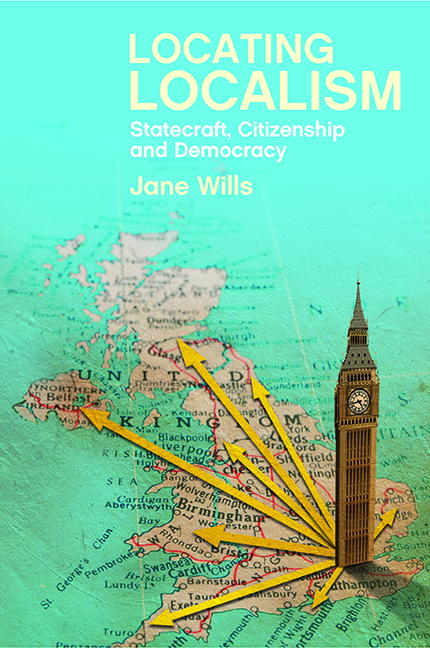Book contents
- Frontmatter
- Dedication
- Contents
- List of figures and tables
- Acknowledgements
- Introduction: the argument being made in this book
- one Making sense of localism
- two The geo-constitution and the long history of localism
- three The place of the people
- four Localist local government
- five Institution building for localist futures
- six Community organising: past, present and future
- seven A localist future?
- Appendix: Research design and methods
- References
- Index
two - The geo-constitution and the long history of localism
Published online by Cambridge University Press: 05 April 2022
- Frontmatter
- Dedication
- Contents
- List of figures and tables
- Acknowledgements
- Introduction: the argument being made in this book
- one Making sense of localism
- two The geo-constitution and the long history of localism
- three The place of the people
- four Localist local government
- five Institution building for localist futures
- six Community organising: past, present and future
- seven A localist future?
- Appendix: Research design and methods
- References
- Index
Summary
As outlined in the previous chapter, advocates of localism see it as a way to respond to a perceived over-centralised state that is argued to have prevented the local state and local communities from taking their own decisions and determining their own destiny. They argue that during the 20th century an expanding national government took over the work that was traditionally done by local government, communities and charities, and this had negative consequences for local democracy, the efficiency and efficaciousness of the services provided, civic engagement and capacity. The reforms and measures associated with localism are thus designed to re-engage people in local decision making through a ‘double-shift’; impacting on the way that politicians and the state work, thereby remaking the civic offer, as well as changing the way that citizens think and act, thereby generating civic capacity.
This chapter provides important historical contextualisation to this debate by exploring the development of the English state and its geography over the last 500 years. This history highlights the way in which local government emerged as part of a centralising state in the years after the Norman Conquest in the 11th century. In a process that is now characterised as a battle between the ‘Norman Yoke’ and an older Anglo-Saxon ‘Gothic culture’ that had already established the rights of the ‘free-born Englishman’, exemplified by the signing of Magna Carta in 1215, England's constitution emerged as a way for the crown to work in tandem with representatives of the people (Loughlin, 2013). In this period, England was unified as a space for government, but in a way in which the crown was accountable – however remotely – to the people via recognition of the rule of law. English common law provided the foundation through which the ‘crown-in-parliament’ was able to govern, using a network of county-level legal representatives to oversee the practices of political administration. Despite being unable to exercise direct control except in exceptional circumstances, the crown used these local representatives to appoint lay justices who oversaw both law and administration across the country. As such, the emerging geo-constitution protected the liberties of local people while also bringing them into a national framework of administrative government.
- Type
- Chapter
- Information
- Locating LocalismStatecraft, Citizenship and Democracy, pp. 43 - 78Publisher: Bristol University PressPrint publication year: 2016



